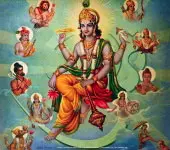Comments
Read more comments
What About Karma of People Who Can Influence the Lives of the Masses
We know about karma. Do good, get back good. Do bad, get back bad. Basically, karma works at the mental level.
You create agitation in someone; the same agitation will come back to you. Someone else will create agitation in you. Same quantity, though it may not be the same cause. For example, if I create fear in your mind by saying there is a ghost in that room, it could come back to me in the form of someone telling me, "Look, there is a snake under your table."
This is how karma gets nullified. Karma always has to get nullified. If it doesn’t get nullified in the present birth, it will get carried forward to the future birth. Then it will reflect in the horoscope of that birth.
Now, this is karma between two individuals or a few individuals.
What about the karma of people who can influence the lives of the masses? The lives of a large number of people, like kings and rulers. When they make a decision, it will affect many people. If it is a ruler, it may affect the entire state or an entire country.
Then what happens? Say the ruler makes a decision that creates agitation in the minds of all the inhabitants of that country. For example, he declares that starting tomorrow, there is no private property in this country. It may be a good or bad thing; we don’t know. But by making such a decision, he creates agitation in many minds. Those who worked hard their whole lives to build a house for themselves, upon hearing it will be taken away, will surely feel agitation, anxiety, fear, and sadness. This may affect crores of people. Let’s say 10 crores of people are affected and agitated by this decision.
This ruler will have to undergo the same agitation—not just once, but in terms of quantity, meaning 10 crore times. There is a limit to human pleasure and suffering. A person can experience emotions only up to a certain level; it is capped by the system's sensitivity. That is why, for higher pleasures, karma sends people to heaven, and for higher levels of suffering, to hell.
So here, there are two possibilities: one, the ruler goes to hell and suffers the agitation there on a fast track; or two, he takes 10 crore more births on Earth and suffers the agitation he caused in each individual until it is exhausted. We may not know which will happen, but either way, the karma has to get nullified in quantity.
See the implication, not on the people, but on the ruler—the ruler as an individual.
This is why our kings of the past were sent to Gurukuls before they became kings. They didn’t just inherit the kingdom. They learned all this before assuming positions of power.
Not just Artha Shastra and Dhanurveda, not just macroeconomics and warfare. They had clarity about all these aspects before they became kings.
Today, forget statesmen—that is an unorganized sector.
Do people in administrative roles, like our IAS and IPS officers, receive training on these principles? In the places where they are trained, could they at least be provided a hint that such things exist? This is how the world really works. Don’t you think it could help? Because, ultimately, they become advisers, and they are the influencers in all decisions.
Recently, Hon. Supreme Court Judge Fali Nariman expressed that the karma model tends to explain everything. This suggests that these are the real principles upon which the world operates.
Why can’t we think about redoing the entire governance process in line with karma, which is what our scriptures have spoken about all throughout?
Knowledge Bank
How do you develop spirituality?
1. Keep on listening and reading about spirituality. 2. Watch programs related to spirituality. 3. Participate in spiritual events. 4. Visit spiritual places. 5. Spend more and more time with spiritually oriented people.
Who Is God Brihaspati?
Brihaspati is an important Vedic God often revered to as DevaGuru. He is both the teacher and priest of the Devas. He is a wise counselor to Devas who makes sure justice prevails all the time. He is also seen as the source of spiritual knowledge, guidance, and wisdom. Brihaspati is associated with Planet Jupiter.



